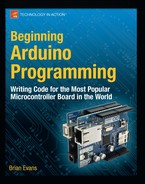Summary
Well, that pretty much wraps up our suggestions for some ways to continue on with your Arduino knowhow, including some new project ideas, introductions to new programming languages, and a little encouragement for getting involved with the open hardware community. Hopefully, you've got some new ideas for projects that you can't wait to get started on. Or maybe you will pick up a new language now that you've got a handle on this one and introduce your Arduino to new capabilities it never knew before. Or maybe I'll see that you have contributed to the community in some way, like posting a project that you're working on or by answering someone's question on some forum.
We're not done with the book just quite yet. Up to now, we have really focused on the topic of beginning Arduino programming, leaving the electronics that we use as a secondary focus. For me though, what makes programming microcontrollers way more interesting than programming other things is the way that code can affect physical things—fading lights, changing the speed of motors, and firing off blenders when your cat gets on the counter. To better understand these things, we will finish our book with a review of some basic principals of working with electronics, taking a closer look at various components and what they do, how to read schematics, discussing techniques for prototyping, and a little simple soldering to better stick two things together. Armed with your understanding of Arduino programming and a fundamental grasp of basic electronics, you'll be ready for anything.
